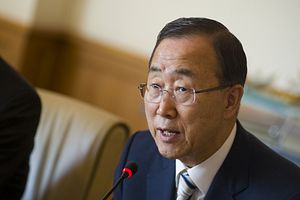In the five years since UN Secretary-General Ban Ki-moon last visited Central Asia, the region has seen a greater backslide in human rights – civil rights, press rights, assembly rights, religious rights – than at any other time in 24 years of independence. When Ban visited in 2010, observers would have been loath to lump Kazakhstan and Tajikistan in with the repressive governments of Uzbekistan and Turkmenistan, but clampdowns in the former two have only accelerated since. All the while, despite Kyrgyzstan boasting the first peaceful transfer of power the region’s known, Bishkek continue threatening to undo the gains found within the 2010 Revolution, morphing Kyrgyzstan from a parliamentary democracy to an outpost for Russia’s autocratic model.
Ban, of course, was not blind to such backsliding – hence his pledge to “encourage the leaders to uphold and implement the international obligations to which they have committed.” During his swing through all five Central Asian states this month, Ban attempted to hold himself to his pledge. And while he may have fallen short on specifics, his presence and his rhetoric stood in stark contrast to Western officials all too eager to forego rhetoric on rights for a focus on stability and security.
Nowhere was Ban’s presence more welcome than in Turkmenistan. Speaking before a group of students, Ban touched on the country’s, and the region’s, perceived stability, and the underlying realities. “Curbing freedoms may create an illusion of stability in the short-run. Things may seem calm on the surface,” he said. “There may not be protests on the streets. But the denial of free expression leads to a brewing underneath and ultimately a breeding ground for extremist ideologies.” The commentary was certainly the most critical Ashgabat has hosted in years. Ban continued, tying Turkmenistan’s issues to Central Asia’s as a whole: “The failure to respect human rights, build accountable institutions, promote political participation, and ensure opportunity for all creates gaps. The wider the gaps, the greater the openings for violent extremists. I see this phenomenon on the rise in the region and it troubles me greatly.”
For good measure, Ban also called on Turkmenistan to allow independent observers to access detention facilities. While the region as a whole maintains deplorable conditions in its prisons, Turkmenistan’s policies engendered a movement to simply prove whether or not political prisoners are alive. Turkmen authorities refuse to acknowledge requests for the status of hundreds of prisoners, many jailed on political charges, imprisoned over the past 15 years. Ban’s calls may yet help ignite the discussion internally – though a decision to allow observation remains far from likely. Moreover, as RFE/RL’s Bruce Pannier points out, “The secretary-general’s speech was not broadcast live and his message was definitely lost in local media coverage.”
While Ban’s critiques and observations elsewhere were perhaps not as pointed as Ashgabat’s audience saw, they remain worth noting. In Kyrgyzstan, for instance, Ban called on authorities to retry all those convicted following the 2010 ethnic clashes in southern Kyrgyzstan, trials that saw ethnic Uzbeks sentenced at a far higher proportion than their ethnic Kyrgyz counterparts. He also called for authorities to “fully and impartially investigate all human rights violations related to the June 2010 ethnic conflict, irrespective of the ethnic origin or status of the accused perpetrators or victims.” Such investigation would involve the case of rights defender and ethnic Uzbek Azimjon Askarov, imprisoned for “organizing mass disturbances” and “inviting interethnic hatred.” Not only was Askarov’s lawyer assaulted during the trial, but police allegedly tortured Askarov.
In Kazakhstan and Uzbekistan, Ban looked to leaders to aid in expanding legal protections for citizens. “[Uzbekistan President Islam] Karimov has emphasized the importance of the rule of law. But laws in the books should be made real in the lives of people,” Ban said after meeting with Karimov. In Kazakhstan, Ban was brusque: “No one wants to be merely tolerated, as if there is something wrong with them. Tolerance must be more active and dynamic.” Ban’s visit to Kazakhstan coincided with the country’s Congress of World Religions, a play at claiming religious tolerance – despite the fact that Kazakhstan is one of 33 nations the U.S. cites for serious religious freedom violations.
It’s perhaps too early to assess fallout from Ban’s visit. And there was ample room for further criticism – to name names, to call further attention to the myriad prisoners, violations, and issues besetting the region. But Ban’s commentary stands as a welcome change from the empty, mealy-mouthed rhetoric Western officials are only too often willing to fall back on. It’s something that, from a rights stance, may point the region in a better direction over the next five years.

































